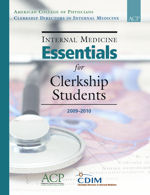Letter to the Editor
A reader reacts to ethics surrounding civilian and war-time prisoner containment.
Protocols offer clear ethics in war time
Regarding the article “War dilemmas put medical ethics under fire” (ACP Internist, July/Aug 2008), the two cases presented should not pose ethical dilemmas to any physician. In civilian life I worked for the California Department of Corrections and Rehabilitation for nine years and am retiring. Recently, I went on active duty to Iraq and was assigned to detainee operations.
In the first example involving gassing (the term for throwing of body fluids and feces by prisoners), best medical practice and standard protocols call for utilizing post-exposure universal blood-borne pathogen procedures, which include precautions such as changing clothes, washing thoroughly and extensive irrigation of mucous membranes and open skin wounds, chemoprophylaxis and post exposure blood testing. Even if a physician were in a position to tell the targeted staff the diseases(s) he knows about, it medically is a bad practice because the physician may not know all the infectious diseases an inmate or detainee has, thus creating a false sense of security.
The second example, involving resolved chest pain, is somewhat more difficult. While in Iraq I was never asked to “clear” a detainee for interrogation. Physicians lose their Geneva Convention status if they participate in interrogations and I feel that being asked to “clear” a detainee could be construed as such. A physician should plan on a disposition for the detainee patient as (s)he would in any other clinical setting, e.g. back to yard, to hospital etc., using best medical practices and judgment with the usual advisory to the detainee patient to return for recurrent symptoms and appropriate follow-up scheduled. The use of medical by prisoners for secondary gain is practically an everyday occurrence and the physician just had better get used to that or not work in a correctional facility/theater internment facility (CF/TIF).
The concept of public interest sometimes overriding patient confidentiality is not new and physicians have been dealing with this for some time. Likewise, if non-accidental injury caused by staff is suspected, there are reporting procedures in place.
Lastly, practicing medicine at Guantanamo or any other detainee facility is not comparable to Nazi doctors' practices. Nazi physicians were conducting sadistic medical experiments which were torture on non-consenting subjects. Detainee medical care is governed by the Geneva Convention. Detainees must be given care and the care must be equal to that given to U.S./Coalition soldiers and prevailing standard of care must be met.
Jean E. Howard, FACP
Address withheld by request





